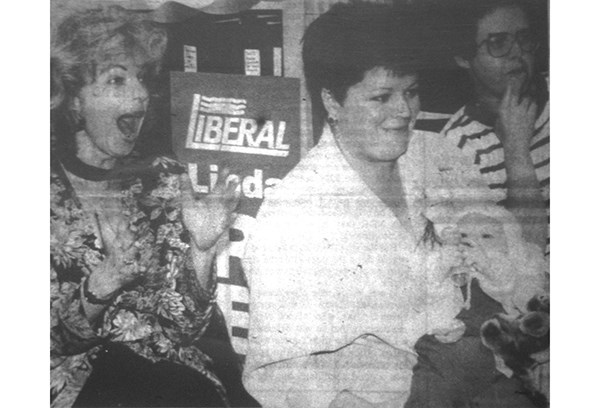Twenty-five years ago, Richmond elected its first woman to the B.C. legislature. Linda Reid, who has never lost an election since and is Victoria’s longest serving MLA, was one of just a handful of women in a house long dominated by older Caucasian men.
It was 1991, a time when B.C.’s house of government wasn’t near as welcoming as it is today, the Richmond East MLA remembered in an interview, a few days before International Women’s Day March 8.
“There wasn’t a single female washroom on the same floor as the chamber. There were four men’s rooms —devoted entirely to what was then almost a completely male chamber.”
Reid got a cold reception by suggesting one, perhaps two, of those washrooms be converted facilities for women.
“I remember distinctly I had a lovely person in this place say to me, ‘Well why would we do that? How long are women going to be elected anyway?’ To which I replied: ‘Long enough to use the washroom.’”
Added Reid: “You should have seen them when I wanted a changing table.”
Helping make the legislature a more welcoming place for women — and encouraging more women to get involved in politics — are among notable achievements in a political career many doubted would begin in 1991.
Reid ran with the B.C. Liberal Party. It had no seats and hadn’t managed to get an MLA elected in B.C. for a decade. She was also running in a city whose two seats (which grew to three in 1991) were held by the reigning Social Credit party: Nick Loenen and former premier Bill Vander Zalm.
A Richmond School District vice-principal, Reid spent evenings and weekends knocking on doors for two years, transforming herself from an unknown entity into an electable candidate.
On Oct. 17, 1991, the 32-year-old Reid won her riding with 41 per cent of the vote. She finished with 6,870 votes, followed closely by the NDP’s Ron Fontaine, who finished with 6,096 votes. The Social Credit challenger, Larry Blaschuk, finished a distant third with 3,703 votes. Liberals also won in Richmond’s two other ridings.
“It was exhilarating. It was absolutely exhilarating. People up to that point had been saying: You won’t win a single seat,” said Reid. “I don’t think anyone anticipated I would win, let alone the school district, so they didn’t hire a replacement vice-principal. So I was the MLA and vice-principal well into January.”
The B.C. Liberal Party, led by Gordon Wilson, won 17 seats and became Official Opposition to a new NDP government led by Mike Harcourt. Reid was just one of three women in the Liberal caucus. In the house, just 19 of 75 MLAs were women, up from the previous 10.
Reid had her two children while serving as an MLA — no easy feat at the time. While pregnant, some suggested she’d have to resign and when daughter Olivia arrived, Reid learned there was no maternity leave, only a $300 fine for each day missed in the house.
“It was just bizarre,” she said. “I said to Gordon Campbell, who was then the leader of the Opposition, ‘If we ever get to government, that’s one of the first things we’re changing.’ I think he decided you shouldn’t argue with a postpartum woman.”
That penalty has since been removed, change tables and wheelchair ramps have been added, a calendar for the legislature has been introduced and programs to assist women are also now in place, making the legislature a “pretty awesome place in terms of supporting families,” said Reid.
“That was one of my goals. This place has to speak to people,” she said. “The world has changed dramatically here and I’m intensely proud of that. We have the highest percentage of women elected anywhere in Canada, in British Columbia today. We’re sitting at 38 per cent.”
Reid is still aiming for gender parity — this year’s International Women’s Day theme. She’s helping pave the way with her involvement in the Women’s Campaign School of the Canadian Women Voters Congress, which teaches would-be female politicians how to run an electoral campaign.
As an MLA for a quarter-century, Reid has plenty of experience to share. Her political career includes 10 years in opposition, eight in cabinet — as minister responsible for early childhood development and for child care — and the rest as deputy speaker or Speaker, her role since 2013.
Being the impartial referee in B.C.’s house of government is constraining and challenging, but sometimes offers a reward she describes as a “magical moment in time”— when all politicians in the house agree on an issue.
Said Reid: “I always said I’d stay as long as I loved the work. And I love the work.”



